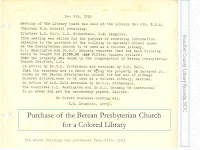
Latest update: 14 June 2024 - gmc
The Clover Club, a local women's literary and musical group of less than 30 members, was founded in 1891. On February 4, 1902, in the 100th anniversary year of the founding of the Beaufort Library Society, the women began a small subscription circulating library. The women's group bought the books as well as served as volunteer librarians. The circulating library was open only a few hours a week and had no permanent base of operations.
At the time of the Fire of 1907, the Clover Club's library collection shared a building on Bay Street with the Masonic Lodges. Most of the Clover Club's library collection was saved due to the heroics of its neighbors. The Library reopened at another location less than a week after the conflagration.
At the Clover Club's 20th anniversary meeting in 1911, the ladies realized a need for a permanent library building and undertook to raise a building fund to meet the requirements of steel industrialist Andrew Carnegie. Carnegie donated more than $40 million of his personal fortune towards 1,679 new library buildings in communities large and small across America. Carnegie believed that "the community which is not willing to maintain a Library had better not possess it" and thus required a local contribution. He built 14 Carnegie Libraries in South Carolina, including the Beaufort Township Library.
 |
| Clover Club Records, BDC |
The Clover Club held a variety of fund-raising theatrical and musical shows beginning in 1911 and influenced local politicians to help. The City of Beaufort donated a lot on the corner of Craven and Carteret Streets. State Senator Neils Christensen procured $7,500 from the Carnegie Foundation of New York for the building, with the understanding that the library would be supported locally.
Like many of the Carnegie Libraries, the Beaufort Township Library was made of brick. Because Carnegie paid for the building materials, many communities used brick, a more costly material to purchase but a material much less costly to maintain by the local communities. Under the terms of the Carnegie program, local communities were responsible for building and maintaining the libraries.
Construction began in early Spring 1917. J.H. Moore of Camden, SC was awarded the contract. The building's cornerstone was installed by the Harmony Masonic Lodge on 7 June 1917.
The installation of the building's cornerstone was handled by the Masons with great dignity.
Because the original Minute book of the Beaufort Township Library Board of Trustees was accidentally destroyed by a fire at the Secretary's home in 1927, we have been unable to discover why there was such a gap in time between the transfer of the Clover Club Collection in October and the official opening of the Library to the public on Monday, March 25, 1918.
For 40 years, members of the Clover Club managed the Beaufort Township Library. Miss Adeline Scheper, was the Librarian for its initial decade, 1918-1928. Mrs. John (Etta) Foster was interim in the immediate aftermath of Miss Scheper's death in 1928. Miss Mabel Runnette was the Beaufort Township Librarian for 30 years, 1928-1958.
 Because of racial segregation, the Beaufort Township Library Board of Trustees purchased the Berean Presbyterian Church in 1931 for $1500.00 in order to provide a library facility for African-Americans. Geneva Green was named Librarian. In 1938 after the death of the prominent African-American attorney who sought so hard to get a public library for Black Beaufortonians, the Colored Branch was re-named the J. I. Washington Public Library.
Because of racial segregation, the Beaufort Township Library Board of Trustees purchased the Berean Presbyterian Church in 1931 for $1500.00 in order to provide a library facility for African-Americans. Geneva Green was named Librarian. In 1938 after the death of the prominent African-American attorney who sought so hard to get a public library for Black Beaufortonians, the Colored Branch was re-named the J. I. Washington Public Library.Here are a few photographs of Beaufort Township Library from our Beaufort County Library Records archival collection housed in the Beaufort District Collection:

You can review an abbreviated Library History on the Beaufort County Library's website.
We suggest that you make an appointment to our Research Room for assured personalized service to review the contents of the Beaufort County Library Records and the contents of the Clover Club Records. We are privileged to take care of both archival collections in the BDC Research Room.
We suggest that you make an appointment to our Research Room for assured personalized service to review the contents of the Beaufort County Library Records and the contents of the Clover Club Records. We are privileged to take care of both archival collections in the BDC Research Room.



















